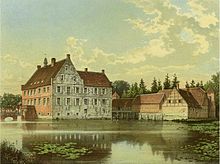Heinrich Wilhelm Droste zu Hülshoff
Heinrich Wilhelm Ernst Droste zu Hülshoff (* December 4, 1704 in Roxel ; † April 14, 1754 ibid) was the cologne treasurer and landlord of Hülshoff Castle .
Life
Origin and family

Heinrich Wilhelm Droste zu Hülshoff was born as the son of the married couple Heinrich Johann I. Droste zu Hülshoff and Anna Mechtild von Lipperheide zu Ihorst and belonged to the 17th generation of his family. His father was vice-dominus of the cathedral chapter of Münster and his great-grandfather Bernhard II von Droste zu Hülshoff (1542–1624) was first mayor of the city of Münster from 1605 to 1619, after five of his ancestors had held the mayor's office there.
Training and gentlemen's journey
On September 12, 1722, Heinrich Wilhelm went on a cavalier tour with his court master Vicar Zumbrink , which took them to Salzburg. He enrolled here on December 12, 1722. A week later there was an imperial audience with Charles VI. (HRR) . After studying for a year, he traveled to Rome for several stations and began studying in Siena . He was considered a skilled rider and fencer. He proved this when he saved the life of the Princess Colonna , who had run over the horses. Out of gratitude, the princess is said to have given him the right to adorn himself with the column from the Colonna family coat of arms. She granted him sanctuary when he was challenged to a duel by Count Fugger on March 27, 1725 on St. Peter's Square and killed him in self-defense. Heinrich-Wilhelm Droste had on his cavalier tour in Salzburg a. a. Count Fugger invited to his farewell dinner, but forgot to drink to him according to his custom. Fugger, who came from a very rich but not very aristocratic family, had resented him so badly that when he happened to meet him again in St. Peter's Square in Rome, he challenged Droste to a duel. It is said that Droste could no longer be happy with his life afterwards. Even on their deathbed, he warned his children urgently against the duels that were frequent at the time.
Heinrich Wilhelm returned to Germany and his journey led to Munich, where he was appointed treasurer (Kurköln) by Clemens August von Bayern and took up his service in his Neuhaus Castle (Schloss Neuhaus) . On December 13, 1730 was Aufschwörung by Heinrich Wilhelm to Munster knighthood instead.
Marriage and litigation with his father-in-law
On November 1, 1729 Heinrich Wilhelm married Brigitte Anna Droste zu Vischering (1708–1750) in Münster St. Servatii , a daughter of the hereditary droster Maximilian Heidenreich Droste zu Vischering . This was already the owner u. a. the goods Burg Vischering and Schloss Darfeld , his wife also brought him the goods Haus Bevern , Haus Asbeck, Haus Vorhelm, Gut Brandlecht , Lengerich etc. into the marriage, which initially was still her mother Amalia von Rhede, widowed Baroness von Büren-Schenckinck, belonged. In order to keep the great fortune together as possible, the hereditary corpse was evidently against marrying all of his daughters and therefore refused to give his son-in-law the usual dowry. This was the cause of a legal dispute that ended in a settlement that Heinrich Wilhelm Droste zu Hülshoff agreed to despite the concerns of his wife and mother-in-law. The Erbdroste had to pay him 25,000 thalers and use the Droste zu Hülshoff as heir in the event that Droste zu Vischering became extinct .
progeny
The marriage produced eight children, including a. his successor Clemens August I. - grandfather of the poet Annette von Droste-Hülshoff -, the general and governor of Münster Heinrich-Johann and the godmother of the poet, the abbess of the Metelen monastery Anna Elisabeth (1733-1805). Two sons became clergymen: Ernst Constanz Canon in Osnabrück , Ferdinand Dechant in Coesfeld .
Act
Heinrich Wilhelm was the first lord and inherited his family's estates, which initially did not look good economically. From his wife's grandmother he received the castle fief Nienborg in Heek , from which he was sworn up as the first family member. The prince-bishop took over the sponsorship of his eldest son, who was named Clemens August as the first family member. Heinrich Wilhelm is said to have played the flute masterfully. He was the grandfather of the composer Maximilian Friedrich von Droste zu Hülshoff . Heinrich Wilhelm donated a crucifixion group by the sculptor Johann Wilhelm Gröninger , which his father had commissioned; a copy is still in the Droste zu Hülshoff family grave in the Roxel cemetery .
literature
- Wilderich from Droste to Hülshoff : 900 years of Droste to Hülshoff . Verlag LPV Hortense von Gelmini, Horben 2018, ISBN 978-3-936509-16-8
- Johann Holsenbürger: The gentlemen v. Eckenbrock (by Droste-Hülshoff) and their possessions . 2 volumes, Regensberg, Münster iW 1868/1869.
- Vol. 1: 1209-1570 . 1868.
- Vol. 2: 1570-1798 . 1869.
- Marcus Weidner: Landadel in Münster 1600–1760, Research on the History of the City of Münster NF , Vol. 18.1, Münster 2000, ISBN 3-402-06641-6 .
Web links
- Droste zu Hülshoff online local family book Coesfeld
- Heinrich Wilhelm von Droste zu Hülshoff GEDBAS genealogy online database
Individual evidence
- ↑ s. Coat of arms on the court and address calendar of the Hochstift Münster
- ↑ Annette von Droste-Hülshoff in the tension between her family. Volume XI. of the series From the German aristocratic archives. CA Starke Verlag, Limburg (Lahn) 1997, ISBN 3-7980-0683-0 .
| personal data | |
|---|---|
| SURNAME | Droste zu Hülshoff, Heinrich Wilhelm |
| ALTERNATIVE NAMES | Droste zu Hülshoff, Heinrich Wilhelm Ernst |
| BRIEF DESCRIPTION | Elector of Cologne Chamberlain |
| DATE OF BIRTH | December 4, 1704 |
| PLACE OF BIRTH | Roxel |
| DATE OF DEATH | April 14, 1754 |
| Place of death | Roxel |

